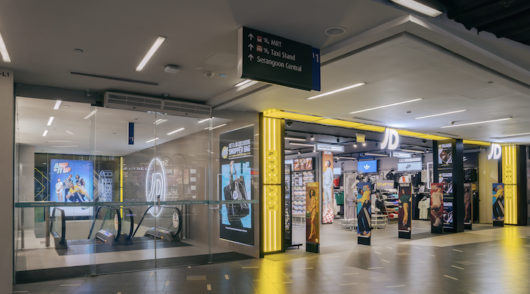
Efforts to keep old textiles out of landfill traditionally have hit a major snag – what to do with the significant portion of products made from a blend of cotton and polyester, which can’t be recycled?
But a new solution from BlockTexx promises to solve that problem. The Sydney-based company, founded less than two years ago by retail veterans Adrian Jones and Graham Ross, has found a way to break down poly-cotton blended textiles into their raw materials so they can be repurposed as other products.
The process, called SOFT (separation of fabric technology), is able to recover roughly 98 per cent of an item’s raw materials in the form of rPET pellets and cellulose powder, which have a wide range of uses in various industries, and produces only water as waste. It is a world-first technology, according to BlockTexx, which has filed a patent application with IP Australia.
BlockTexx is still in the process of selecting the location of its first recycling facility – it expects to be operational in Q1 2020 – but the solution has already garnered interest from major players in the retail space, including youth fashion chain General Pants and signage supplier AFI Branding.
General Pants is launching a trial program, where it will send items it can no longer sell or donate to BlockTexx instead of to landfill, which is the current solution.
“We already donate items that are usable but not resellable to charities we have relationships with like the Salvos, Vinnies and Red Cross. But the remainder, unfortunately, goes to waste,” Sacha Laing, CEO of General Pants, told Inside Retail Weekly.
“What the BlockTexx solution will enable us to do is send those items we can’t reuse back through the supply chain to be turned into their raw materials.”
Those raw materials – rPET pellets and cellulose powder – are in high demand in the textile, food, building and other industries, where they are used to make everything from eco-friendly textiles to plastic bottles.
“What’s great is we’re not just recycling textiles,” Laing said, “we’re helping other industries reduce the amount of importing of those raw materials they need to do, which is great for the environment and the economy.”
The BlockTexx partnership is just one part of General Pants’ long-term vision to achieve a net-zero-carbon footprint. Later this year, the retailer will launch denim “amnesty” bins in stores, where customers can drop off unwanted jeans to be recycled, rather than throwing them in the trash. It also plans to stop providing plastic bags and switch to more sustainable energy solutions, such as LED lighting.
General Pants may not be the first name that comes to mind when you think of sustainable retailers, but the privately held company has a solid track record of considering the environmental impact of its operations.
“It’s something that is very close to all of our hearts on a personal and professional level, but we’re not the sort of business that talks a lot about it… We just get on it with it,” Laing said.
According to Laing, however, General Pants too often has been held back by the lack of technology available to deal with one of the biggest contributors to the fashion industry’s carbon footprint – textile waste.
“The lack of technology, or the speed at which technology develops in this space, particularly the infrastructure for textile recycling, is the biggest challenge,” he said.
“Part of what we’re doing [with BlockTexx] is developing a reverse logistics solution that’s commercially viable, so we can move products from our stores and customers’ homes back through our supply chain to BlockTexx, and ultimately back into industry.”
AFI Branding, a signage specialist that works with most major retailers in Australia, including Myer, Lovisa and Adidas, is also tackling the reverse logistics issue.
The company is launching a takeback scheme on August 1, which will enable retailers to return their fabric signage to AFI at the end of the season or sale, rather than throwing it away. AFI will bundle the signage and send it to BlockTexx for recycling.
“Once BlockTexx converts [the old signage] into rPET pellets, we can reuse some of it to make our next batch of fabric,” said Glenn Watson, managing director of AFI Branding.
AFI’s signage is 100 per cent polyester, which can take between 20 and 200 years to break down in landfill, according to ethical fashion guide Good On You. Watson estimates the company produces over 1000 tonnes of signage a year.
“We recently started packaging up just the offcuts of what we produce here, before it even goes to the retailer, and just our waste amounts to approximately 40 tonnes per year,” he said.
This figure reveals the scope of the problem BlockTexx is dealing with. In 2017, the fashion industry globally was producing an estimated 92 million tonnes of textile waste annually, according to The Boston Consulting Group. By 2030, that figure is expected to climb to 148 million tonnes.
And much of it is poly-cotton blended textiles, which cannot be recycled using current techniques. Watson has encountered many organisations offering to turn blended textiles into an “alternate energy source” – code for incineration.
“Not very environmentally-friendly in my opinion,” he said.
Ultimately, BlockTexx aims to make it as easy and ingrained to recycle textiles as it is to recycle plastic bottles.
“We wouldn’t leave a plastic bottle on the street – there’s a container scheme. But that plastic bottle is made from polyester, as are our clothes. We just see plastic in our clothes differently,” said Adrian Jones, co-founder of BlockTexx.
Still, Jones is optimistic that BlockTexx can help spark a cultural shift, if only because it provides a commercial incentive for businesses and consumers to stop sending textiles to landfill.
“Textile waste is a huge environmental issue, but it’s also a fantastic business opportunity. There’s value in those products if you can upcycle them.”






